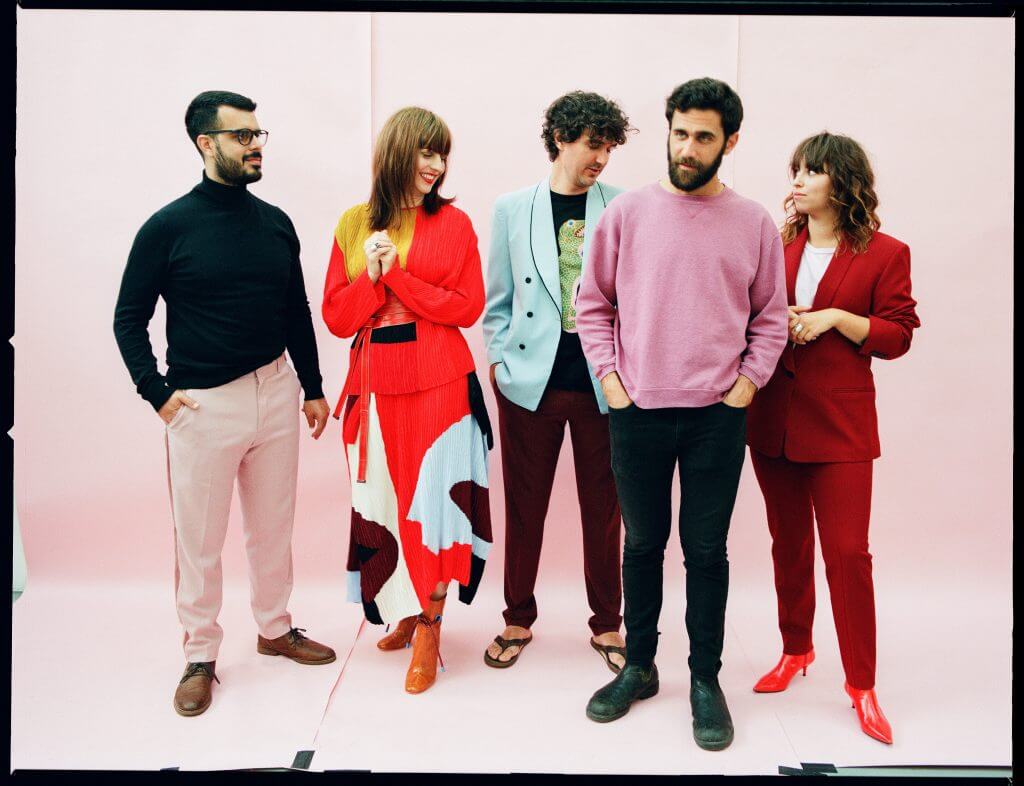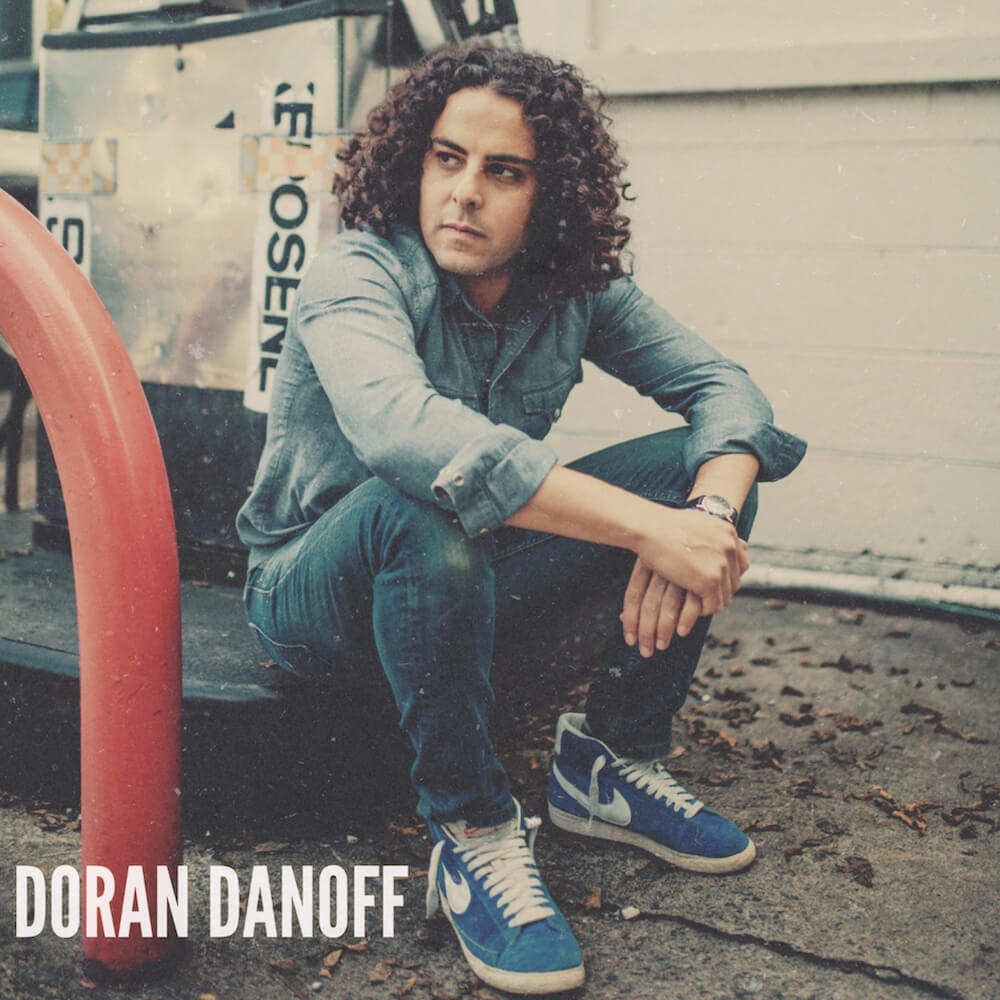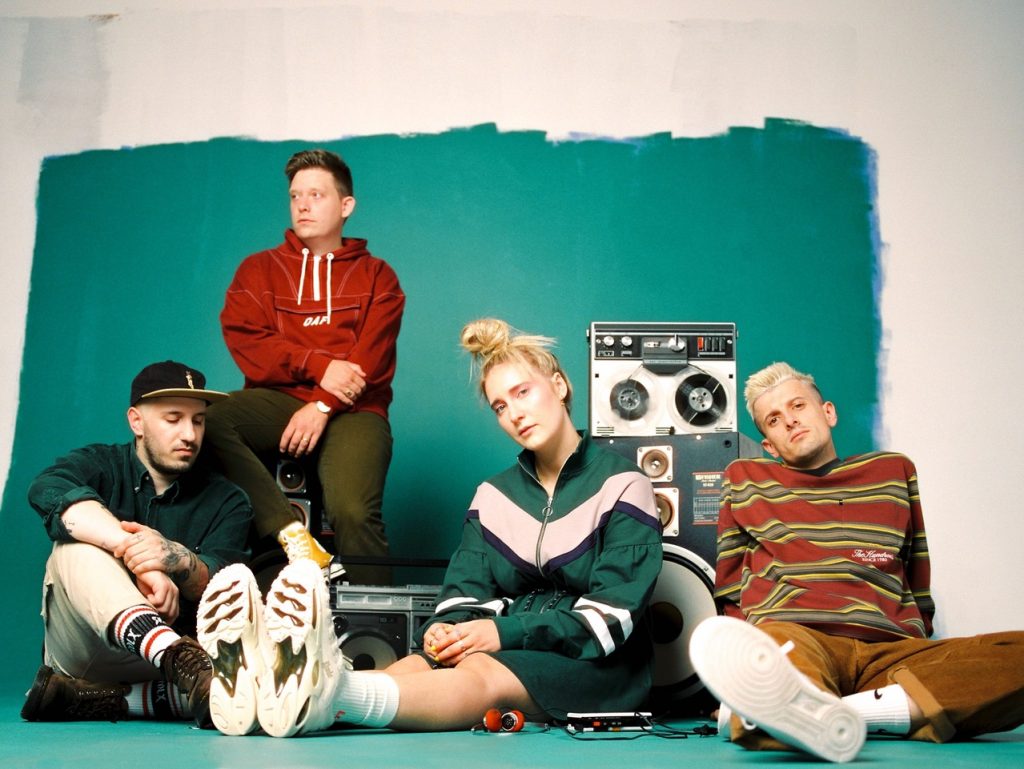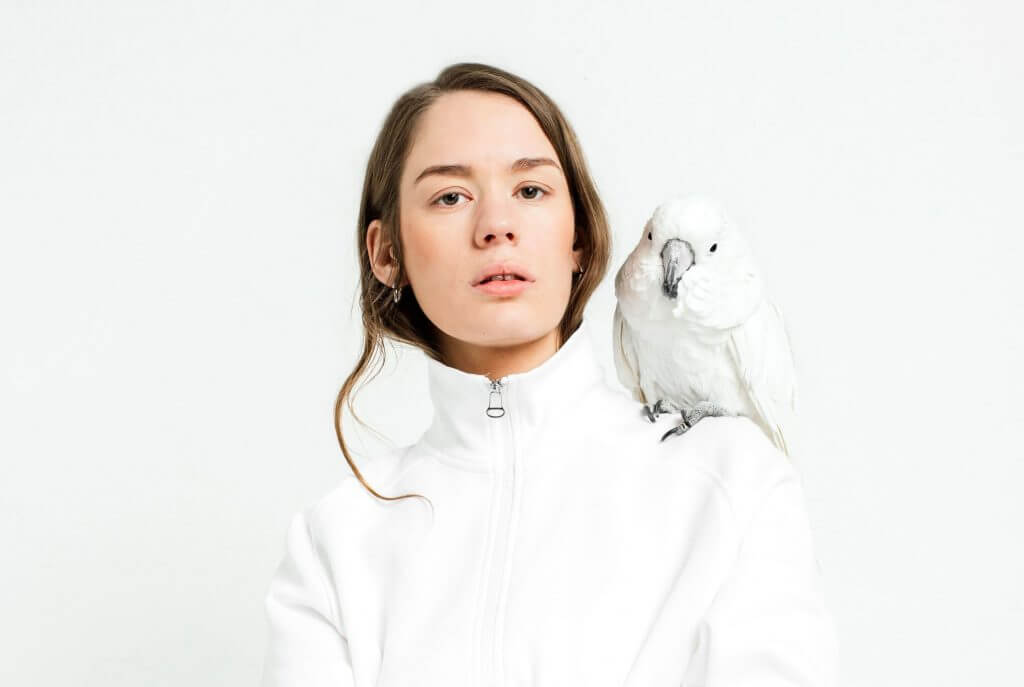Sis Unfurls Their Musical Moonsail

San Francisco musical collective Sis was born out of the artistic restlessness of singer and composer Jenny Gillespie Mason, a self-proclaimed “former folkie” who decided she wanted to record new music on a OP-1 synth. So far, the group has released two songs, “Moonsail” and “My King Plays Bowie”. Their first full-length album, Euphorbia, will be released on Native Cat Recordings in August 2018. On both tracks, electronic and acoustic instruments interweave to create a tight, immersive sound that gracefully incorporates influences from R&B, electronica, and folk. The band’s website defines Sis as a “serendipitous, scary and smooth combustion”–a testament to both the diversity of their artistic influences (from D’Angelo to Radiohead to Fleetwood Mac) and the organic, piecemeal way the group came together. Jenny Gillespie Mason told me the band’s creation story, explained her songwriting style, and outlined what to expect from the rest of Euphorbia come August.
 L to R: Jamie Riotto (bass/keys/guitar), Jenny Gillespie Mason (vocals/songwriting/production/keys/electric and acoustic guitars), Rob Shelton (keys/production/vocals), Andrew Maguire (drums/percussion/marimba), Carly Bond (electric and acoustic guitar/bass clarinet/keys/vocals)
L to R: Jamie Riotto (bass/keys/guitar), Jenny Gillespie Mason (vocals/songwriting/production/keys/electric and acoustic guitars), Rob Shelton (keys/production/vocals), Andrew Maguire (drums/percussion/marimba), Carly Bond (electric and acoustic guitar/bass clarinet/keys/vocals)Introduce us to Sis. How did the band come to be?
Sis came together quite serendipitously and oddly. I had moved from Chicago to San Francisco in 2013, and in 2015 I was pregnant with my second child. I’d made a few solo folk-pop records on my own from 2008-2014, but by 2015 I hadn’t made any music in quite a while. I didn’t know exactly what I wanted to do, but I knew three things: I wanted to try to write using an OP-1 synth, because I was obsessed with Bon Iver’s record “22, A Million” and heard he’d written it on that; I wanted to work with drummer Joseph Adamik from Chicago, who I’d enjoyed working with on my solo album “Chamma”; and I wanted to work at Tiny Telephone, an all-analog studio in San Francisco owned by the very friendly and sweet John Vanderslice. I reached out to Tiny Telephone, and John suggested I worked with Rob Shelton, an engineer/producer at Tiny Telephone.
What has the songwriting process been like for the group?
When I met Rob for pre-production he had a very kind and open energy, and we were excited about working on music together. However, I had to cancel our first session due to health issues with my pregnancy. By 2016, when I was finally ready to do the session, I’d had my baby and wasn’t feeling very good about the original songs anymore. So I wrote a whole batch of new ones in response to the election, that were kind of political and Laurie Anderson-ish. But I didn’t feel very connected to those either. When I got to the studio, we first worked on “My King Plays Bowie”, and I knew I wanted the rest of the album to domino from this particular kind of song–an electro-pop record of experimental love songs. I also knew that the other songs, the more political ones, would not work in this world I was building with Rob. So I went home that week and wrote “Gene”, “Moonsail”, and “Crosshairs”, which are all tighter rewrites of the more sprawling, folk-pop political songs I’d originally thought to record.
Rob and I took each song and went really deep with foundational instrumentation, rewriting them together to make them even weirder and shapelier. As the other band members started to arrive, it became clear this was really a band project. Everyone had their own ideas and flavors to add to the session, especially Joseph Adamik. I knew I had been called to work with him again for a reason. At some point Rob and I agreed to keep going with it and to call it a band, and to make it legit. It was originally called Sis and the Lower Wisdom, but then we shortened it to Sis as that seemed to reflect the R&B thing we had going on in a lot of the songs. From April 2017 to October 2017 we worked on the record, and I continued to write songs for it.
How would you define your sound?
I would call the sound “soft outré”. It’s soothing and beautiful, but also weird, with clashing, almost violent dissonance at times that makes it more of a piece of art than easy listening. But it’s all woven into a kind of bed of intricate sound, a bed that’s stitched by each player with real heart and energy.
The band’s influences are quite stylistically diverse, from Frank Ocean to Kate Bush to Steve Reich. Can you speak to how some of those influences manifest in your songs, either musically or philosophically?
I think Frank manifested because I was listening a lot to his album “Blonde”, and there is a playful looseness to his recording work. There is a fearlessness and a messy, vital life contained in his voice, his performance and his lyrics. I wanted that to come through in my own vocal performance and in the music itself: a kind of casual, vibrant looseness.
Kate Bush is a huge influence in the way she makes her voice a persona. She is theatrical but also a little broken in her singing, which makes it very intimate and big at the same time.
As for Reich, I had a very spiritual experience a year ago while listening to his piece “Electric Counterpoint” in Yosemite while I was blindfolded and on mushrooms. That experience really streamed into my songwriting, especially in the use of meditative swaths of repetition in the guitar work. Also, it became clear that everyone in the band had been wanting to work with their Reichian influence, so this session seemed like a perfect opportunity. I think the Reich comes through a lot at the end of the song “Crosshairs” if you listen closely.
Lyrically, both “Moonsail” and “My King Plays Bowie” depict intimate episodes with one other person. Your lyrics have some surprising imagery, and the feeling of love is really palpable in both songs. What specifically was going on in your life when you were writing these two songs? I’m especially interested in what the line “Tonight with you’s a moonsail” means to you.
I had been reading a lot about pirates and pirate boats with my 4-year-old, and there is actually a sail called a moonsail. So I used it here as a term for a beautiful night together of just floating on each others’ bodies. I spent a few nights on a boat in Maine in my early thirties, and I’d always wanted to write a song about the absolute romance and freedom of that experience. Also, it’s funny but I kept calling the studio itself a “boat” as I was recording. It feels like a little ship with all the lovely wood paneling in there. At first I needed to lie down a lot because of all the energy I was putting into the recording, so I’d lie down and think up lyrics. So that’s where, “Lie down with me in this boat…” at the beginning of “Moonsail” came from. So it felt right to encapsulate all of those floating thoughts into a direct address to a special You, in a song about an intimate night together.
“My King Plays Bowie” was the first song I wrote for the record. I wrote it the week after Prince died. I actually had a dream where I was in a basement with Prince. There were some glass doors and a horde of people trying to get in, and Prince shut the velvet purple curtains and told me in his throaty sexy voice, “Just shut them all out, Jenny.” After I had that dream I wrote the song very quickly, and I do feel his spirit is in there. It’s also a nod to the great Bowie. It’s about how we will keep him alive through playing his work, and how we keep our younger selves alive. I had gotten my husband, who I’ve been with for twelve years, a piano book of Bowie songs, and watching him play those in the days after Bowie died was so moving. It’s hard to write a song about the experience of parenting, or about long-term relationships, and also make it a love song, but I think I did it pretty well here.

The band website mentions that you are a “former folkie” but, as you mentioned before, you composed songs for this album on the OP-1 synth. What brought about that transition?
I’d been experimenting with electronica sounds in previous works, including my 2012 album “Chamma”, using a Maschine controller. My 2014 album Cure for Dreaming was a very direct folk-pop album recorded with session players down in LA. It’s a beautiful and very polished album, but after that I was ready to veer left again and try something completely different–something created in the moment with other people. That seems to be my pattern from album to album–I need to keep myself excited and not get bored, so I’ll learn a new instrument or write in a new way. The OP-1 synth seemed like a perfect vehicle for that. It’s a small synth that you can create 4 tracks on, including a drum track, and it has many manipulation effects, so you have 10,000 ways to get at one sound. It’s a really vast tool in a small package, and it allows you to explore on the go. So I actually wrote a lot on it on Ocean Beach in San Francisco!
You have a full-length album coming out in August 2018 called Euphorbia. What’s it about?
For the most part, the songs are love songs. They’re portraits of women and men I have loved as friends and lovers and whose psyches I’ve tried to explore in song form. A few songs, such as “Wild Parrot” and “Strange Summer”, are about emotional pain in relationships and individuation. A professor in my MFA poetry program told me that my poems are beautiful but always have an edge of anxiety in them.
I think Euphorbia is a kind of plant that Rob stumbled upon in a hike, and when he mentioned it as an album title it really worked for me. The experience of making the album was euphoric, but I’m also afraid of euphoria since it’s ephemeral and it’s not something to be trusted. Life is painful as a whole, so we have to be mindful of impermanence even in joyful states. So I think the music reflects that–it’s beautiful but also edged with unsettledness.
Is there a tour in the works as well? Any plans to come to NYC?
We are hoping to tour along the West Coast in August 2018 when the album comes out. But we would love to play in NYC and will definitely try to make it happen!
We like to have our featured artists give shout-outs. Are there any other current bands whose work excites you in particular?
I love the bands that I’m putting out on my own label, Native Cat: red steppes, and Meernaa. I also just discovered a UK artist, Jane Weaver, who is in her mid-forties and making stunning psychedelic music. I love seeing women creating music into their forties and fifties and beyond. It’s time we champion that mature goddess energy as a culture!






Responses